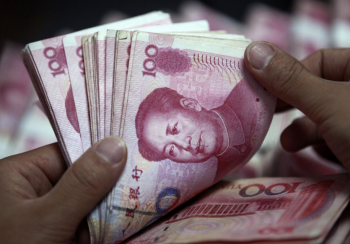
The great China slowdown – part 3
China cut its interest rates for the sixth time in less than a year as the economy grew by 6.9 per cent in the September 2015 Quarter, its lowest growth rate in 25 years.
As consumption rises in importance – last year services accounted for 48.2 per cent of output – observers are shifting their focus from electricity demand to shopping. September saw a 10.9 per cent annual increase in retail sales, the fastest pace this year.
China’s reduction to record-low rates and anticipated stimulus in Europe and Japan add to monetary policy divergence with the U.S., where the Federal Reserve is considering its first rate increase in nine years.
Surging debt in China combined with property over-investment were ignored by local governments, which have limited tax powers, and so rely on land sales; and this generally leads to more property development. There was a belief that the central government will prop up cities and this would induce banks to lend with little regard for creditworthiness.
Meanwhile, we question whether China will pursue further renminbi devaluation in an attempt to reflate its economy – China will be selling things cheaper in US Dollar terms, which is bad for its competitors, particularly those from emerging economies. This adds to global deflation, and that is exactly what central banks in developed markets are trying to defeat.
We have mentioned a number of times several emerging economies, particularly in Eastern Europe, that have borrowed massively in foreign currency in the past and any depreciation of their currency creates solvency issues. The last thing the world needs in times of slow global growth is a credit crunch, but such a credit crunch somewhere within emerging markets may be increasingly likely.
To learn more about our domestic and global funds, please click here, or contact me, David Buckland, on 02 8046 5000 or at dbuckland@montinvest.com.
Nigel Stemson
:
Hi David, as always interesting to read.
I have one query, I accept that for an emerging nation to borrow in massively in foreign currency is indeed fraught with danger, as they are a debtor nation, but I believe in China’s case, they are a net creditor nation, so it is a different situation. Although they have created a lot of debt it is in RMB, and not say US$
David Buckland
:
Thank you Nigel. I believe further devaluation of the RMB will harm those emerging economies which have high external indebtedness, as their competitive position comes under pressure and their currency declines.
Can I please refer you to http://rogermontgomery.com/eastern-europe-the-epicenter-of-our-next-crisis/ and specifically to the following “Countries like Romania, Ukraine, Poland, Belarus and Turkey have a combination of high current account deficits and high external indebtedness. Also, any exchange rate devaluation would increase pressure to service more foreign currency debt, not unlike the Swiss Loans, which was pumped into Aussie farmers in the mid-1980s”. Regards, David
Nigel
:
Hi David, as always interesting to read.
I have one query, I accept that for an emerging nation to borrow in massively in foreign currency is indeed fraught with danger, as they are a debtor nation, but I believe in China’s case, they are a net creditor nation, so it is a different situation. Although they have created a lot of debt it is in RMB, and not say US$
Jim Hasn
:
Hi David
Many thanks for your article. “.. we question whether China will pursue further renminbi devaluation…”, does this mean you think that China will pursue devaluation or not? What you describe is the essence to me of the so-called “currency wars”. It maybe that the recent devaluation had the effect stopping the US Fed raising their rates when we were expecting them to.
David Buckland
:
Thanks Jim,
if China’s manufacturing economy continues to slow, which seems like a better than even chance, then further devaluation is probable.
I think the last devaluation played a role in terms of the additional volatility in share markets markets in August, so be prepared!